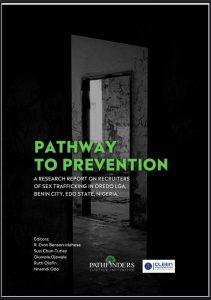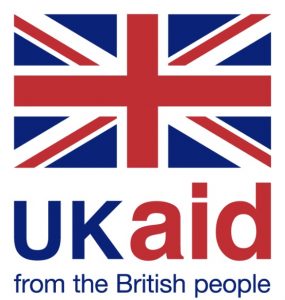 BENIN CITY, EDO (SEPTEMBER 29, 2020). Pathfinders, in partnership with CLEEN Foundation, is excited to present our ground-breaking research findings on Enablers (recruiters) of sex trafficking in Oredo Local Government Area in Benin City, Edo State, Nigeria.
BENIN CITY, EDO (SEPTEMBER 29, 2020). Pathfinders, in partnership with CLEEN Foundation, is excited to present our ground-breaking research findings on Enablers (recruiters) of sex trafficking in Oredo Local Government Area in Benin City, Edo State, Nigeria.The ‘Pathway to Prevention’ research Project was conducted over a period of one year (September 2019- September 2020) in Oredo LGA and is the first to focus solely on recruiters of sex trafficking from one of the most endemic hot-spots in Africa. 3,600 surveys/questionnaires were administered to a cross-section of the Oredo LGA population (60% urban/40% rural), 60 participants engaged in 10 Focus Group Discussions and 24 Key Informant Interviews were conducted. Significantly, it was imperative that we included the voices of trafficking survivors, women who were unsuccessfully recruited as well reformed recruiters and traffickers, as their lived experience was necessary to reflect the breadth of the interlocking issues.
Our hypothesis was that as entrenched, critical initiating actors, recruiters serve as the link between potential victims and traffickers. As such, we hypothesized that breaking the link to potential victims could potentially lead to an overall reduction of trafficking from Edo State. We are pleased to note that the research confirmed our hypothesis. The following are some key highlights:
- Awareness is high and as expected, trafficking is prevalent in the community (99.3% of respondents were generally aware of the term “sex trafficking”); 92.3% understood trafficking was a crime and 60.1% indicated that they were aware of the penalties.
- Television/radio, friends/colleagues/word of mouth, news, social media, and school were ranked the top 5 ways Respondents learned of trafficking.
- Nearly 1 in 4 respondents (23.3%) knew someone who has been sex trafficked abroad.
- However 43.2% would not know who to inform if they came to know of a specific case of sex trafficking occurring in their community.
- Push Factors for why sex trafficking continues to occur in the community included poverty, ignorance, family pressure, status symbol and the general insecurity/ poor infrastructure in Nigeria.
- Recruiters are generally women (according to 73.7% of respondents) who are older than their victims (44.6% indicated that recruiters were 36-45 years old) whose primary motivation for recruiting was the “need for money.”
- Recruiters are known members of the local community (63.5% indicated it was someone they knew), as opposed to strangers (25%).
- Recruiters were categorized into digital Enablers and physical Enablers, in light of their increasing use of technology to advance their crimes online (Facebook and WhatsApp, primarily). It was estimated that they are paid between N200,000 to N400,000 per recruit.
- Community complicity and tolerance, complex immigration regulations and fees that prohibit safe, legal migration, endemic recruiting locations in Oredo and the ease of online recruiting were noted as the reasons for the continued proliferation of recruiting in the community.
- 85.6% of respondents were unaware of “effective programs” that are in place to prevent sex trafficking in Edo.
- Respondents indicated that more effort should be placed on: increasing community awareness of job/training opportunities; increasing prosecutions; publicly naming and shaming recruiters; targeting parents (particularly mothers) who are the primary actors targeted by recruiters in light of the pressure many are already placing on their daughters to travel abroad; decreasing demand in destination countries; abandoning ineffective alarmist awareness campaigns (Don’t Travel- Libya is Bad!!), unless they are coupled with viable economic alternatives; addressing the mindset in Edo that has accepted prostitution as a viable alternative to poverty; making reporting of recruiters easier; addressing the gender disparities that render women vulnerable to trafficking since legislation along does not mitigate vulnerability to trafficking, utilizing community informed/designed interventions; inter alia.
The Research booklet, which details our findings, conclusions, recommendations (from both the Oredo LGA community and the researchers) and outlines areas for further research, was publicly disseminated at our September 29, 2020 Dissemination Meeting conducted in Benin City, Edo State. Fifty (50) strategic key stakeholders, including the Benin Zonal Commander of the National Agency for the Prohibition of Trafficking in Persons (NAPTIP), representatives of Network of Civil Society Organizations Against Child Trafficking, Abuse and Labour (NACTAL) and Edo State Task Force Against Human Trafficking (ETAHT), were in attendance (in-person and online), following our Validation Workshop that was conducted on September 24, 2020. We followed the Dissemination Meeting with the launch of our Pilot, Each One Reach One, which pairs Pathfinders’ survivors of trafficking with women who are potentially vulnerable to becoming trafficked in an effort to “slave-proof” the latter.
This Report could not be more timely, particularly in light of the ongoing COVID-19 pandemic which has led to additional economic hardship for many returnees (and people who are potentially vulnerable to trafficking) who have indicated their desire to attempt a second effort to reach Europe once borders formally reopen. Now is the time to take action to prevent and protect. Our recommendations outline precisely how this can be achieved.
Finally, it is our belief that the research findings will serve to slave-proof local communities from recruiters and inform future policies and programs/interventions. You can read and download the full Report here. Our summary findings, conclusions and recommendations from our Dissemination Meeting can be downloaded here. If you would like more information or a hard copy of the report, please email info@pathfindersji.org or call our office on +234 817 612-3228.
The research was funded with UK aid from the UK Government. We thank our partners at the Foreign, Commonwealth and Development Office (formerly Department for International Development) and UK Aid for the unrelenting support that afforded us the opportunity to birth this project. #Not4Sale #EndSlavery #EndTrafficking




Recent Comments